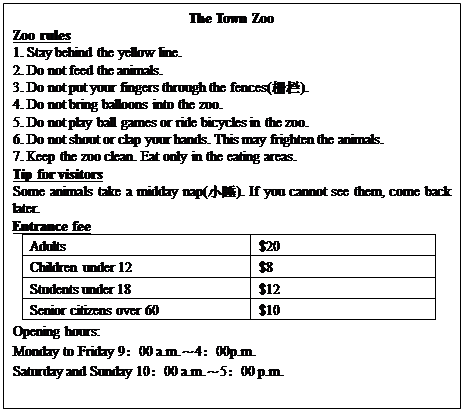
科目: 來源: 題型:閱讀理解
查看答案和解析>>
科目: 來源: 題型:閱讀理解

查看答案和解析>>
科目: 來源: 題型:閱讀理解

查看答案和解析>>
科目: 來源: 題型:閱讀理解

查看答案和解析>>
科目: 來源: 題型:閱讀理解

查看答案和解析>>
科目: 來源: 題型:閱讀理解
查看答案和解析>>
科目: 來源: 題型:閱讀理解

Now lots of teenagers like smoking. It's a big problem. Some of them smoke, just for fun and some think smoking looks cool. Others smoke because there are many people around them that smoke.
As we all know, smoking is harmful, especially to students. Some teenagers even steal money so that they can buy cigarettes. Besides, smoking does harm to brains and it can influence studies. Finally, it is bad for health because it can cause diseases.
Therefore(因此), we should protect ourselves from smoking. First, we should learn more about the danger of smoking. Second, we should keep away from people who smoke
查看答案和解析>>
科目: 來源: 題型:閱讀理解
查看答案和解析>>
科目: 來源: 題型:閱讀理解
查看答案和解析>>
科目: 來源: 題型:閱讀理解
| Children’s Training Center | |
| English Time: 10:00 am – 11:00 am On Mon. and Tues. Room: 201 Teacher: Lucy King from USA Enjoy easy English with fun! | Computer Time: 2:00 pm – 4:00 pm on Wed. and Fri. Room: 503 Teacher: Colin Philips from Australia Find yourself surfing on the internet freely! |
| Drawing Time: 9:00 am – 11:00 am on Thurs. Room: 307 Teacher: Sun Yang from Hangzhou Your life in art starts here! | Swimming Time: 3:00 pm – 5:00 pm on Sun. Place: Swimming pool Teacher: Mr Zhang from Ningbo sports school See yourself in the magic waterland! |
查看答案和解析>>
湖北省互聯(lián)網(wǎng)違法和不良信息舉報平臺 | 網(wǎng)上有害信息舉報專區(qū) | 電信詐騙舉報專區(qū) | 涉歷史虛無主義有害信息舉報專區(qū) | 涉企侵權(quán)舉報專區(qū)
違法和不良信息舉報電話:027-86699610 舉報郵箱:58377363@163.com